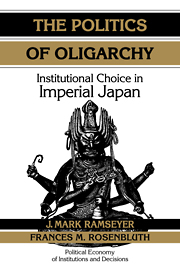Book contents
- Frontmatter
- Contents
- List of tables and figure
- Series editors' preface
- Acknowledgments
- CHAPTER 1 INTRODUCTION
- CHAPTER 2 THE COLLAPSE OF OLIGARCHY: FAILED ATTEMPTS AT CARTEL-MAINTENANCE
- CHAPTER 3 CONCESSION OR FACADE: THE MEIJI CONSTITUTION
- CHAPTER 4 ELECTORAL RULES AND PARTY COMPETITION: THE STRUGGLE FOR POLITICAL SURVIVAL
- CHAPTER 5 THE BUREAUCRACY: WHO RULED WHOM?
- CHAPTER 6 THE COURTS: WHO MONITORED WHOM?
- CHAPTER 7 THE MILITARY: MASTER OF ITS OWN FATE
- CHAPTER 8 FINANCIAL POLITICS
- CHAPTER 9 RAILROAD POLITICS
- CHAPTER 10 COTTON POLITICS
- CHAPTER 11 CONCLUSION: INSTITUTIONS AND POLITICAL CONTROL
- Notes
- References
- Index
Series editors' preface
Published online by Cambridge University Press: 05 June 2012
- Frontmatter
- Contents
- List of tables and figure
- Series editors' preface
- Acknowledgments
- CHAPTER 1 INTRODUCTION
- CHAPTER 2 THE COLLAPSE OF OLIGARCHY: FAILED ATTEMPTS AT CARTEL-MAINTENANCE
- CHAPTER 3 CONCESSION OR FACADE: THE MEIJI CONSTITUTION
- CHAPTER 4 ELECTORAL RULES AND PARTY COMPETITION: THE STRUGGLE FOR POLITICAL SURVIVAL
- CHAPTER 5 THE BUREAUCRACY: WHO RULED WHOM?
- CHAPTER 6 THE COURTS: WHO MONITORED WHOM?
- CHAPTER 7 THE MILITARY: MASTER OF ITS OWN FATE
- CHAPTER 8 FINANCIAL POLITICS
- CHAPTER 9 RAILROAD POLITICS
- CHAPTER 10 COTTON POLITICS
- CHAPTER 11 CONCLUSION: INSTITUTIONS AND POLITICAL CONTROL
- Notes
- References
- Index
Summary
The Cambridge series on the Political Economy of Institutions and Decisions is built around attempts to answer two central questions: How do institutions evolve in response to individual incentives, strategies, and choices, and how do institutions affect the performance of political and economic systems? The scope of the series is comparative and historical rather than international or specifically American, and the focus is positive rather than normative.
This book challenges conventional preconceptions and historical interpretations about institutional design in Meiji Japan. For some scholars, the oligarchs creating the Meiji Constitution were selfless state-builders, designing an independent bureaucracy and judiciary to maximize the economic growth of the country as a whole. Ramseyer and Rosenbluth carefully delineate the private interests of the Meiji oligarchs as well, and trace out the many ways in which competition among these oligarchs and their repeated failure to cooperate with each other led instead to the creation of institutions facilitating lobbying as a byproduct of factional conflict. Studying the actual institutions in great detail, the authors show how the electoral system created incentives for politicians to provide private goods rather than productive investment, and the ways in which bureaucrats did not act as independent principals. Their careful historical examination of the strategies of leaders embedded in a straightforward rational choice model of institutional development, and the principal results that followed, are reinforced by an examination of the development of three economic sectors – banks, railroads, and textiles.
- Type
- Chapter
- Information
- The Politics of OligarchyInstitutional Choice in Imperial Japan, pp. xv - xviPublisher: Cambridge University PressPrint publication year: 1995



